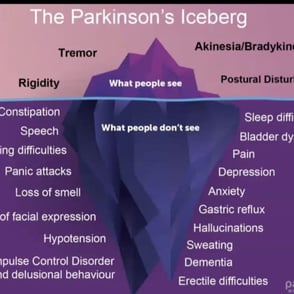
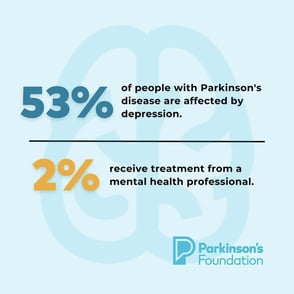
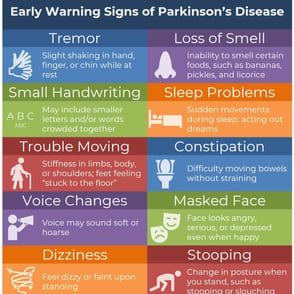
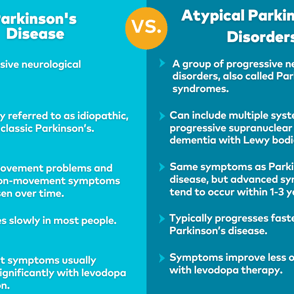
A medical team for Parkinson's disease typically includes:
A neurologist or movement disorders specialist to assess disease progression and prescribe medications
A family doctor who is knowledgeable about Parkinson's
A Parkinson's nurse specialist who can provide information on how to manage the condition
A psychiatrist or psychologist who can help with mental and emotional health issues
A physiotherapist who can assess mobility, balance, and posture
An occupational therapist who can assess the living and working environment
A speech language pathologist who can help with voice projection or swallowing difficulties
A dietician who can advise on how to plan a healthy diet
A social worker who can advise on financial and family concerns
Parkinson's disease has both motor and non-motor symptoms:
Motor symptoms
These include:
Bradykinesia, or slow movement
Resting tremor
Rigidity
Walking or gait difficulty
Dystonia
Speech problems
Swallowing issues
Non-motor symptoms
These include:
Depression and other mood problems
Cognitive issues
Constipation and other gastrointestinal problems
Fatigue
Freezing
Hallucinations and delusions
Incontinence
Low blood pressure problems
Sleep problems
Other issues such as pain, sexual dysfunction, and vision changes
Non-motor symptoms can appear years or decades before motor symptoms, and can be vague. Early detection of non-motor symptoms can help with diagnosis and improve prognosis.
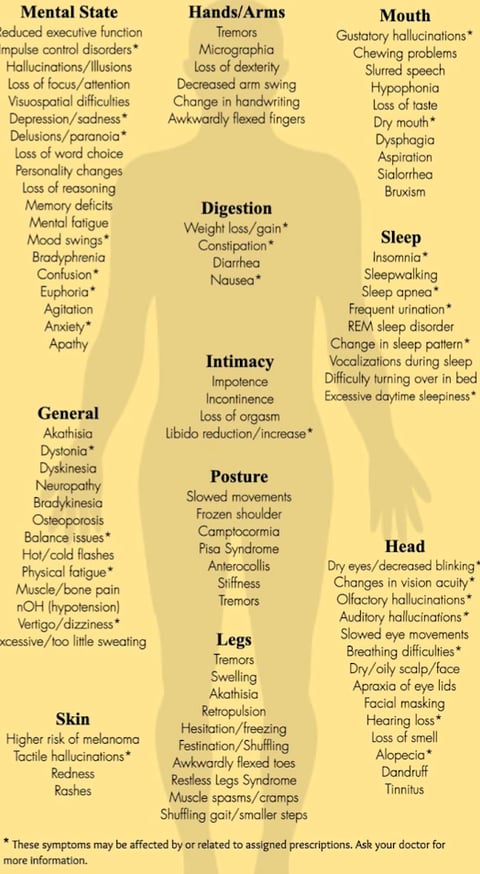

What medications are used to treat Parkinson's symptoms?
Medications to treat Parkinson'shttps://www.parkinson.ca/wp-content/uploads/Medications-to-Treat-Parkinsons-Disease.pdf
Drug Therapies
Dopaminergic drugs (including levodopa) – a class of drugs with dopamine-like action used to treat symptoms of Parkinson's disease
Decarboxylase inhibitor – a drug that is used with levodopa to treat the symptoms of Parkinson's disease
Dopamine agonists – a class of drugs that binds to dopamine receptors and imitates the action of dopamine
Anticholinergics – a class of drugs that relaxes smooth muscle and is used primarily to treat tremor in Parkinson's disease
MAO-B inhibitors – a class of drugs used to treat all symptoms of Parkinson's disease. These drugs block an enzyme that breaks down dopamine, allowing it to be at the receptor longer
COMT inhibitors – a class of drugs that binds to dopamine receptors and imitates the action of dopamine
Although medications for Parkinson's disease can be used to improve motor function, they may lose their effectiveness over time, cause side effects, or both. Additionally, as the condition progresses, the medication levels required for motor function control may cause intolerable or undesirable side effects.Write your text here...
Medications - What you need to knowhttps://www.parkinson.ca/wp-content/uploads/Parkinsons-Medications-what-you-need-to-know.pdf


Women with Parkinson's disease (PD) may experience unique challenges, including:
Diagnosis
Women tend to be diagnosed younger and may be of childbearing age. Menopause can also complicate diagnosis and treatment.
Symptoms
Women may report different symptoms than men, including more mood and sleep disturbances, anxiety, depression, fatigue, and pain. They may also experience more non-motor symptoms, such as anxiety, depression, and fatigue.
Medication
Women may experience more medication-related dyskinesias (involuntary, erratic movements), motor fluctuations, and “wearing off” of medication.
Treatment
Women are less likely to receive advanced treatments like Deep Brain Stimulation (DBS).
Care
Women are less likely to be cared for by a PD specialist, neurologist, or movement disorder specialist. They also access medical care for their Parkinson's less than men.
https://www.pmdalliance.org/?s=women PMD Alliance
Women and Parkinson's https://www.parkinson.ca/women/highlight=women




What is ClinicalTrials.gov and who uses it?
ClinicalTrials.gov is a website and online database of clinical research studies and information about their results. The purpose of ClinicalTrials.gov is to provide information about clinical research studies to the public, researchers, and health care professionals. The U.S. government does not review or approve the safety and science of all studies listed on this website.
Participate in Research Studies
Many research studies into Parkinson's disease need human volunteers to answer specific health questions. Your participation in these research studies allows you to access new treatments for Parkinson's disease before they are widely available and contributes to medical research.
Get access to new treatments for Parkinson's disease before they are widely available and help others by contributing to medical research
You have the power to propel research toward Parkinson’s breakthroughs and, ultimately, a cure. No amount of funding or other resources can make up for a lack of volunteers in Parkinson’s research.
